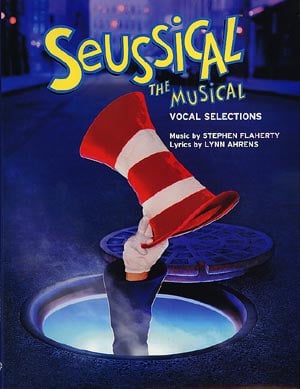
'SEUSSICAL! THE MUSICAL' gets an "okay" production at Beck
Theodor Seuss Geisel was born in 1904 in Springfield, MA. He held a doctorate in literature from Oxford University in England. In 1936, on the way to a vacation in Europe, while listening to the rhythm of the ship's engines, he came up with And to Think That I Saw It on Mulberry Street. It was the first in what was to be a long line of children’s books. Ironically, the volume was rejected by the first 43 publishers to whom he showed it.
In 1954, a report concerning illiteracy among school children stated that kids were having trouble reading because their books were boring. Using a list of 250 words, which was considered to be the number a first grader could absorb at one time, he designed and wrote The Cat in the Hat. It became an instant success. What followed was a series of children’s books that have sold over 100 million volumes.
Why are the books so engaging? Geisel created whimsical characters, wrote in convoluted rhyme and rhythm schemes and allowed children’s imaginations to run wild. Most important from the standpoint of adults, are the morals and messages the books taught including respect for differences, the keeping of promises and the uniqueness of each individual.
In 2001 the author’s reputation took another step forward with the Broadway opening of ‘SEUSSICAL! THE MUSICAL,’ a contemporary re-imagining of Dr. Seuss, which weaves together many of his most famous stories and characters. The Tony Award winning team of Lynn Ahrens and Stephen Flaherty (‘RAGTIME’ and ‘ONCE ON THIS ISLAND’) created a score which includes pop, gospel, blues and R & B music.
On its opening ‘SEUSSICAL! THE MUSICAL’ was greeted with reviews that called it, “imaginative,” whimsical,” and “abounding with invention and visual surprises.” Any production of the show, in order to fulfill the Dr. Seuss philosophy, must contain those qualities.
The Beck Center production, under the direction of Scott Spence, fulfills some of the requirements, but falls short on others. The major missing element was the whimsy. There has to be consistent exaggeration and the unexpected. In spite of some clever gimmicks, such as the use of roller skating and scooters used in “It’s Possible,” and the flashlights and Groucho-eyebrows-and-nosed glasses in “Havin’ A Hunch, too much of the show lacked excitement, lacked the needed pizzazz.
The performances ranged from wonderful to acceptable. Tracee Patterson stole the show as Gertrude McFuzz, the bird with the short tail, who is infatuated with Horton the Elephant. Her renditions of “The One Feather Tail of Miss Gertrude McFuzz” and “All for You” were show stoppers. Jarred Nichols had exactly the right tone of exaggeration as Mr. Mayor (the leader of The Whos). Sean Szaller danced with proper abandonment as one of the Wickershams. The chorus, as a whole, stayed in character and sung and danced with the right moods and feelings.
Patrick Carroll had the proper slow moving gate of Horton the Elephant, but lacked the vocal ability to develop the moods of his solos and the acting dynamics necessary to build a compelling character. As Boy, young Christopher Gaertner displayed a nice singing voice, but was too automatic in his performance. He needed to play himself--a real boy--instead of trying to act like a boy. As Sour Kangaroo, Tonya Broach displayed nice vocal abilities, but it was impossible to understand the words that she was singing due to either poor articulation.
In the pivotal role of The Cat in the Hat, Marc Moritz needed to create a character who was a delightfully spirited boy inside the body of a man, or, in this case, a rambunctious kitten in the body of a full grown cat. He needed a constant sparkle in his eye and movements which got the audience ready for him to verbally pounce at any moment. The show depends on his setting the proper mood. He did that in several scenes, but just wasn’t consistent, wasn’t whimsical enough in others.
Martin Cespedes, is quickly establishing himself as THE major local musical theatre choreographer. He does not disappoint in this show. The creative movements, which change to fit each musical variation, were wonderful and he prepped his performers well. Richard Gould’s scenic design is delightful and functional. Sharon Stark’s costume renderings are wonderful.
Musical Director Larry Goodpaster’s orchestra played well, but at times drowned out the performers. If we can’t hear the words to songs, there is no sense in the cast singing them.
Roland Massatti’s sound design was lacking. Many of the performers couldn’t be heard (at least not from the side section of the theatre where I was seated). When I asked the technician if the sound system was working correctly I was told it was. Obviously, not so from the standpoint of my well functioning ears.
A question that parents might ask, is whether ‘SEUSSICAL’ is a kids’ show? Though grown-ups, teens and tweens should find the show reminds them of why they came to love the stories, young children may find it difficult sitting through the production as the story line does not follow the books they may be familiar with. In addition, there may not be enough abandonment in the two-and-a-half hour production to hold a little one’s attention.
CAPSULE JUDGEMENT: ‘ SEUSSICAL! THE MUSICAL’ is a cute script. The Beck Center give it an acceptable, but not the promised “loosey-gooseical lollapaloozical magical” performance promised on the show’s program cover.

